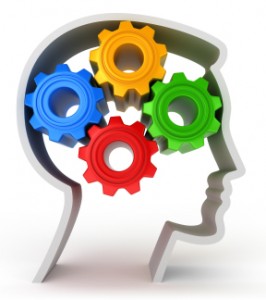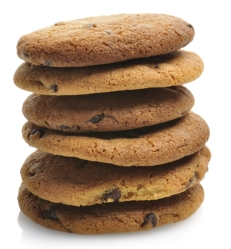By Loretta Breuning
Fellow Mammals,
 We all strive for healthy habits, but unhealthy habits often take us by surprise. To understand why, it helps to know how the brain builds habits.
We all strive for healthy habits, but unhealthy habits often take us by surprise. To understand why, it helps to know how the brain builds habits.
A habit is a real physical pathway in the brain. Electricity flows effortlessly down a well-developed pathway, which is why the behavior come easily. A child who builds good habits will find it easy to take self-care steps, and a child who builds bad habits will find it easy to do things that damage their long-run well-being.
We are born with lots of neurons, but very few connections between them. Connections build every time our happy and unhappy brains chemicals are released. This wires us to repeat a behavior that felt good, and avoid a behavior that felt bad. This is how mammals wired themselves for survival before the era of language, diplomas, and curriculum development experts.
The neural pathways you build when you’re young become superhighways in your brain, thanks to a chemical called myelin. Your myelinated pathways make it easy to do things that felt good when you were young, and avoid things that hurt when you were young. After you’re 20, myelin plummets, and new superhighways are hard to build. Helping a child build healthy habits is the best legacy you can leave.
The brain learns from what feels good
Eating a cookie feels good because it stimulates dopamine. Getting a hug feels good because it stimulates oxytocin. Getting respect for your strength or your looks feels good because it stimulates serotonin. Our brain evolved to promote survival, and eating is linked to survival in many different ways. We end up with many conflicting impulses about how to feel good and how to survive.
If you eat a second cookie, little dopamine is stimulated because it’s not meeting a real need. The brain is designed to motivate you to do things that meet your needs. Dopamine motivates a monkey to keep trying to crack open a nut after it has failed for ten frustrating minutes. If you eat pre-shelled nuts out of a bag in front of the television, you don’t get as much dopamine. But you might do it anyway because the first bag of nuts built a pathway, and you haven’t learned other ways of stimulating your dopamine. The brain is constantly looking for ways to stimulate more happy chemicals because that led to survival in the state of nature.
Broccoli feels good
 Broccoli stimulates less dopamine than a cookie at first, because the primitive brain responds to calorie-rich foods. But you can wire yourself to enjoy the way broccoli meets your real needs. Imagine the strength you have when you eat healthy food. Repeat that image and you build a neural pathway linking broccoli to your happy chemicals. Your dopamine will flow as soon as you plan an outing to the farmers market because you are meeting a need.
Broccoli stimulates less dopamine than a cookie at first, because the primitive brain responds to calorie-rich foods. But you can wire yourself to enjoy the way broccoli meets your real needs. Imagine the strength you have when you eat healthy food. Repeat that image and you build a neural pathway linking broccoli to your happy chemicals. Your dopamine will flow as soon as you plan an outing to the farmers market because you are meeting a need.
A child responds to what feels good now because the joy of meeting long-run needs is a complex neural pathway that takes time to build. A hug feels good now. This is why parents play such a big role in the building of good habits.
But it’s complicated. Refusing to eat broccoli may feel good to a young brain. Power and attention feel good, and a young brain may learn that food fits are a way to get it. Just giving a child too much applause for eating vegetables can teach the wrong lesson. The right lesson is that self-care feels good. Excessive concern for looking good or fighting disease can wire in unhappy pathways in the long run. We must be very careful about which behaviors we reward because a young brain is always learning from what gets rewarded.
Over time, the approval of peers competes with the approval of parents. When a child gets social approval, the good feeling of serotonin and oxytocin pave neural pathways that wire them to repeat the behavior. We end up with many different pathways inclining us toward different ways of meeting our needs. Belonging feels good and getting respect feels good. But we can learn to seek social rewards in ways that don’t compromise our self-care.
Distraction feels good
A cookie can distract you from bad feelings. A child may learn that the good feeling of eating relieves a bad moment. Neurons connect in that moment and your brain can wire in the idea that food relieves problems. Each time it works, the pathway builds. This is why it’s important to learn healthy distractions. We have to learn to live with frustration because problems can’t always be solved in a minute. Preparing healthy food is a great way to relieve frustration. The brain can wire itself to enjoy the act of preparing food without overeating.
 If you see your parent eat a cookie when they feel bad, it wires you to eat a cookie when you feel bad. We don’t repeat everything our parents do because we have other influences. If you watch a sibling go for a run when they feel bad, you may wire yourself to do that. But mirror neurons play a huge role in our self-care habits. They are special neurons that activate when you watch another individual get a reward or avoid pain. The activation is weak compared to doing the behavior yourself, but if you watch it over and over, a big pathway builds.
If you see your parent eat a cookie when they feel bad, it wires you to eat a cookie when you feel bad. We don’t repeat everything our parents do because we have other influences. If you watch a sibling go for a run when they feel bad, you may wire yourself to do that. But mirror neurons play a huge role in our self-care habits. They are special neurons that activate when you watch another individual get a reward or avoid pain. The activation is weak compared to doing the behavior yourself, but if you watch it over and over, a big pathway builds.
But it’s complicated. Some parents act like they will die if they eat a cookie, whether from weight gain or disease. Enormous anxiety about food choices can get wired in. We are not prisoners of our early circuits – indeed our power to re-shape them is the subject of my book Meet Your Happy Chemicals. But a child who starts life with the habit of feeling good about self-care has a huge head start.
The power of early role models
In adult life, we notice our early wiring because we find words to explain our actions. But we can learn to notice the core of our own self-care habits. A touching blog post about this is The Role Model in You by Len Saunders. Then well-known child fitness expert asked people to reflect on the role model they have inside them when it comes to eating and exercise. The comments very widely- some people learned healthy habits from their parents, and others learned to make healthy choices despite their parents’ habits. This blog post was a fascinating reminder of how our unique early experiences make us who we are.
My children are grown and my parents are gone, but I teach children about self care at my local zoo. As a zoo docent, I tell kids how animals exert themselves in the quest for healthy food. Self-care seems like fun when animals do it.
– Loretta Breuning, InnerMammalInstitute.org
